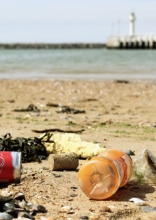
At this moment in time, science cannot say exactly how much plastics flow to the sea via rivers, and where exactly that plastic is at any given time. Existing water and sediment samples techniques remain very time and labor intensive. Therefore, innovative and automated detection methods are needed. They need to provide faster and more detailed data to feed computer models that calculate the flow of the plastics, identify the accumulation zones, and help to better understand its distribution in the water column and sediments.
In the strategic cluster project PLUXIN (Plastic Flux for Innovation and Business Opportunities in Flanders) funded by the Flemish government, VLIZ, VITO, Ghent University, University of Antwerp and KU Leuven – together with The Blue Cluster and 13 companies – are joining forces to map plastic pollution in some Flemish ports and rivers, and to invent innovative remediation solutions.
In the next three years of the project (September 2020-2023) focus will lay on the development of a 2-dimensional horizontal distribution model of plastics. The model can be refined with experiments, samplings and field tests. Remote sensing and artificial intelligence must be able to automatically detect and identify plastic waste. In addition to the horizontal spread, the vertical movements of the plastic in the water column will also be traced, both by laboratory tests and in situ samples. Factors such as weathering, biofouling and fragmentation will be taken into account.
PLUXIN will be scoping out the economic and social valorisation. Thanks to the project partners' strong knowledge base and extensive technological know-how, the newly acquired knowledge must lead to innovation projects for Flemish companies and knowledge institutions active in waterworks, observation, remediation and waste processing. The strategy of the Blue Cluster is to tackle the problem upstream: to stop the plastic before it ends up in the sea or/and to remove it from water and sediments by commercial remediation initiatives.
The project partners are assisted in this by an extensive (international) scientific advisory board, government agencies and civil society organizations. In this way, this project can be seen as a platform where knowledge institutions, companies, external scientists, policymakers and citizens enter into dialogue with each other to enter into future developments in the context of blue innovation in Flanders.
The Flanders Marine Institute is the coordinator of the PLUXIN project and will support the project partners in the sampling of micro- and macroplastics, and experimental work in the Marine Station Ostend. VLIZ is also responsible for the work package on the valorisation of the research results in order to develop groundbreaking commercial initiatives for the sanitation of plastics in water and sediments.
PLUXIN partners:
With the support of the Flemish government - Agency for Innovation and Entrepreneurship (VLAIO)
Contact person at VLIZ: Gert Everaert: gert.everaert@vliz.be
Link: www.blauwecluster.be/project/pluxin
(c) Image - Leontien De Wulf (VLIZ)